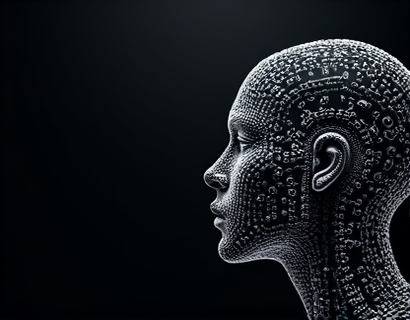Elevating User Engagement in Next-Gen Digital Marketing Ecosystems: The Synergy of AI and Crypto
The intersection of artificial intelligence (AI) and cryptocurrency is paving the way for a new era in digital marketing, one that promises unprecedented levels of user engagement and interaction. This article explores the advanced strategies that merge these two transformative technologies, creating a more interactive and effective digital experience for tech enthusiasts and early adopters. By leveraging the unique capabilities of blockchain and machine learning, brands can foster seamless interactions and drive growth in the evolving online landscape.
The traditional digital marketing landscape is rapidly changing, driven by technological advancements and shifting consumer behaviors. As users become more discerning and tech-savvy, brands must adapt to remain relevant. The integration of AI and crypto offers a powerful solution, enabling marketers to create personalized, dynamic, and secure experiences that resonate deeply with their target audiences. This synergy not only enhances user engagement but also opens new avenues for data-driven decision-making and innovative business models.
Understanding the Basics: AI and Crypto in Digital Marketing
To fully appreciate the potential of AI and crypto in digital marketing, it's essential to understand the fundamental concepts of each technology.
Artificial Intelligence refers to the simulation of human intelligence processes by machines, particularly computer systems. These processes include learning (the acquisition of information and rules for using it), reasoning (using rules to reach approximate or definite conclusions), and self-correction. In digital marketing, AI is used for tasks such as predictive analytics, customer segmentation, chatbots, and content generation.
Cryptocurrency, on the other hand, is a digital or virtual currency that uses cryptography for security. It operates on a decentralized blockchain network, which ensures transparency, immutability, and security. Cryptocurrencies like Bitcoin and Ethereum have gained widespread adoption, but their potential in digital marketing is just beginning to be realized.
The combination of AI and crypto creates a synergistic effect that amplifies the strengths of both technologies. AI can process and analyze vast amounts of data from blockchain transactions, providing insights that drive more effective marketing strategies. Conversely, the security and transparency of blockchain can enhance the trust and reliability of AI-driven marketing tools.
Enhanced Personalization through AI and Crypto
One of the most significant benefits of integrating AI and crypto in digital marketing is the ability to deliver highly personalized experiences to users. Traditional marketing often relies on broad demographic data, which can lead to generic and less effective campaigns. AI and crypto enable a more granular approach, leveraging individual user data to create tailored interactions.
Blockchain technology ensures that user data is securely stored and managed, giving users greater control over their information. AI algorithms can then analyze this data to identify patterns, preferences, and behaviors, allowing marketers to create highly targeted campaigns. For instance, a user's past purchases, browsing history, and social media activity can be used to recommend products or content that align with their interests.
Moreover, the use of smart contracts on the blockchain can automate and enforce personalized marketing actions. For example, a smart contract can trigger a specific offer or discount based on a user's engagement level or loyalty status, ensuring that the right message reaches the right person at the right time.
Increased Transparency and Trust
Trust is a critical factor in digital marketing, and the integration of AI and crypto can significantly enhance transparency and build user trust. Blockchain's decentralized and immutable nature provides a tamper-proof record of transactions and interactions, which can be audited by both brands and users. This transparency helps to mitigate concerns about data privacy and security, fostering a more trusting relationship between brands and their audiences.
AI can further bolster trust by providing clear and explainable insights into how user data is used and processed. Machine learning models can be designed to highlight the benefits of data sharing, such as personalized experiences and rewards, while ensuring that user privacy is respected. This balance of transparency and utility can lead to higher user engagement and loyalty.
Dynamic Content Creation and Delivery
AI-powered content creation is another area where the combination of AI and crypto can revolutionize digital marketing. Traditional content creation is often static and time-consuming, limiting the ability to respond quickly to user needs and trends. AI algorithms can generate dynamic content that adapts in real-time based on user interactions and preferences.
For example, AI can create customized product descriptions, social media posts, and even entire websites that are optimized for individual users. This not only enhances the user experience but also improves search engine rankings, as search engines favor content that is relevant and engaging. Additionally, the use of NFTs (Non-Fungible Tokens) on the blockchain can add a unique and verifiable element to digital content, further enhancing its value and authenticity.
Smart contracts can also automate the distribution and monetization of dynamic content. For instance, a content creator can set up a smart contract that releases exclusive content to users who have reached a certain engagement milestone, ensuring that the content is only accessible to those who have demonstrated genuine interest.
Secure and Decentralized User Interactions
The security and privacy of user interactions are paramount in digital marketing. The integration of AI and crypto addresses these concerns by providing secure and decentralized solutions. Blockchain technology ensures that user data and transactions are protected from unauthorized access and manipulation, reducing the risk of data breaches and fraud.
AI can enhance security by detecting and mitigating potential threats in real-time. Machine learning algorithms can analyze user behavior patterns to identify anomalies and prevent fraudulent activities such as account takeovers and phishing attacks. This proactive approach to security can significantly reduce the trust barriers that often hinder user engagement.
Furthermore, the decentralized nature of blockchain allows for peer-to-peer interactions without the need for intermediaries. This not only reduces costs but also empowers users by giving them direct control over their data and transactions. AI can facilitate these interactions by providing intuitive interfaces and automated processes, making the experience seamless and user-friendly.
Incentivization and Reward Systems
Incentivizing user engagement is a key challenge in digital marketing, and the combination of AI and crypto offers innovative solutions. Cryptocurrencies and tokens can be used to create robust reward systems that motivate users to interact with brands in meaningful ways.
For example, a brand can issue its own utility token that users earn by completing specific actions such as watching videos, leaving reviews, or participating in surveys. These tokens can then be redeemed for discounts, exclusive content, or other rewards, creating a virtuous cycle of engagement. AI can optimize these reward systems by analyzing user behavior and adjusting incentives in real-time to maximize participation and satisfaction.
Smart contracts can automate the distribution of rewards, ensuring that users receive their incentives promptly and transparently. This automation not only enhances the user experience but also reduces administrative overhead for brands, making the process more efficient and cost-effective.
Data-Driven Decision Making
The integration of AI and crypto provides marketers with unprecedented access to data, enabling more informed and strategic decision-making. Blockchain ensures that data is accurate, tamper-proof, and easily verifiable, while AI can process and analyze this data at scale to uncover valuable insights.
For instance, AI can identify trends and patterns in user behavior, helping brands to refine their marketing strategies and allocate resources more effectively. Predictive analytics can forecast user actions and preferences, allowing for proactive rather than reactive marketing. This data-driven approach can lead to higher conversion rates, improved customer retention, and increased overall performance.
Moreover, the use of decentralized data markets, facilitated by blockchain, can provide brands with access to high-quality, third-party data sources. AI can integrate and analyze data from multiple sources, creating a comprehensive view of the user landscape. This holistic approach can uncover new opportunities and insights that traditional data sources might miss.
Challenges and Considerations
While the potential of AI and crypto in digital marketing is vast, there are several challenges and considerations that brands must address. One of the primary concerns is the regulatory environment, as both AI and crypto are subject to evolving laws and guidelines. Brands must ensure compliance with data protection regulations, anti-money laundering (AML) laws, and other relevant regulations to avoid legal issues.
Another challenge is the technical complexity of integrating AI and crypto solutions. Brands may need to invest in specialized talent and infrastructure to implement these technologies effectively. Additionally, there is a learning curve associated with understanding and leveraging the full potential of AI and crypto, which can be a barrier for some organizations.
Privacy is also a critical consideration. While blockchain offers transparency, it can also raise concerns about user privacy if not implemented carefully. Brands must strike a balance between leveraging user data for personalization and respecting user privacy. Implementing privacy-preserving techniques such as zero-knowledge proofs and differential privacy can help address these concerns.
Future Trends and Opportunities
As AI and crypto continue to evolve, the possibilities for their integration in digital marketing will only expand. One emerging trend is the use of decentralized finance (DeFi) platforms to create new financial models for marketing. DeFi can offer innovative ways to fund marketing campaigns, manage budgets, and reward users, all while maintaining transparency and security.
Another area of growth is the integration of AI-powered virtual assistants and chatbots with blockchain-based identity verification. This combination can enhance user authentication and personalization, creating a more seamless and secure user experience.
Furthermore, the rise of Web3 and the metaverse presents new opportunities for brands to engage with users in immersive and interactive environments. AI and crypto can play a crucial role in these emerging ecosystems, enabling secure transactions, personalized experiences, and decentralized governance models.
In conclusion, the synergy of AI and crypto is poised to transform digital marketing, offering brands powerful tools to enhance user engagement, drive growth, and innovate in the next-gen online landscape. By embracing these technologies, brands can create more interactive, secure, and personalized experiences that resonate deeply with tech-savvy users and early adopters.










































